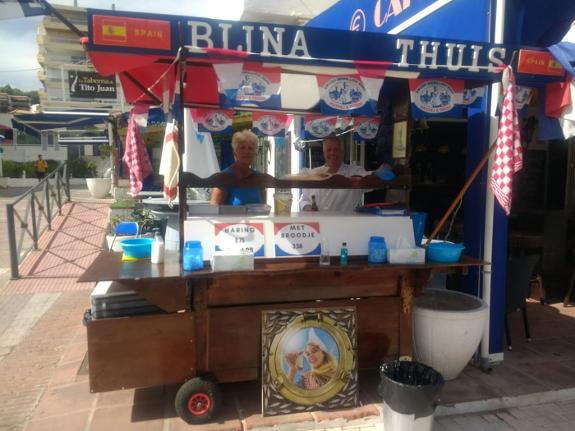The uniting powers of herring
The Hofmans started selling traditional marinated herring in Torremolinos last year. Elizabeth speaks about the dish's international connections
ALEKK M. SAANDERS
Jueves, 4 de febrero 2021, 20:16
Pickled herrings have been a staple in Northern Europe since Medieval times. Now, since last January, the herring counter has expanded to the south of Spain, to Torremolinos.
There we find John and Elizabeth Hofman. This Dutch couple are known for their special love of 'maatjesharing' - Dutch-style soused herring.
A year ago they opened their counter beside the Euro bar at the very heart of La Carihuela. It became a showcase for traditional Dutch gastronomy on the Costa del Sol.
In this interview Elizabeth points out how marinated herring is something that unites many nations on the coast.
What distinguishes the Dutch herring from others?
First of all, old tradition. 'Matjesharing' became a staple dish of the Netherlands in the Middle Ages. Our herrings are "ripened" for a couple of days in oak barrels in a salty solution, or brine. It's this special brine that makes the Dutch soused herring special. It is much sweeter than other European equivalents and gives the fish a distinctive sharply piquant flavour.
When did you decide to launch your herring business?
At the beginning of last year we decided to open a 'Haring' stall in the most Dutch place on the Costa del Sol - La Carihuela of Torremolinos. Here there are many bars and restaurants owned by Dutch people, as well as a supermarket and hairdressers, and the Netherlands consulate is also located here. The only thing missing was a herring sale counter and this is our principal gastronomic tradition! We even say that herring holds a special place in the heart of every Dutch person.
Do non-Dutch people buy your herrings?
I admit that raw herring is definitely not for everyone. But we have some people from Germany, France and Scandinavian countries who like it because they have something similar. In the Nordic countries, for example, herring flavoured with mustard or onion is eaten with dark rye bread, crisp bread, as well as sour cream, or potatoes. Sure, many people have bought the typical Swedish herrings in the Ikea food shop. However, John offers only 'fresh soused' herring from Holland, with diced raw onions and gherkins, decorated with the Dutch flag. Our herring is also supposed to be eaten in a special way. The only true Dutch way to enjoy herring is vertically, raising the fish above the mouth and taking generous bites from the dangling herring.
Are only residents or guests of Torremolinos your customers?
No, not at all. The Dutch who live in other towns on the Costa del Sol come here to eat our herring. For example, we have permanent Dutch customers from Marbella and Fuengirola. A Russian woman from Mijas often comes with her Ukrainian husband. They say that pickled herring is very common in Eastern European cuisine as well. There, it is cut into pieces and served covered with minced boiled vegetables and seasoned with mayonnaise.
What about British people?
We found out that 'soused herring' in English can also mean a cooked marinated herring. But the Dutch herring is almost raw. So some Brits compare our herring with kipper. But one English man said that in his hometown he used to eat bloaters, herrings that are salted and lightly smoked without gutting. I guess this English recipe was inspired by the invention of our national hero, a fisherman called William Buckels. In the 14th century, he got the idea of gibbing - to salt herrings and pack them into barrels. It is believed that the emperor Charles V even erected a statue to Buckels honouring his fish preservation technique that had beneficial consequences for the country.
Charles V was Spanish. Do Spanish people nowadays try your herring as well?
Not particularly... though Spanish people have their traditional 'arenques', sardines salted in wooden barrels. There are also numerous ways to serve pilchard in many regional recipes: raw, fermented, pickled or cured in other ways. For example, marinated fish is typical of Andalusian gastronomy. I know that in many restaurants in Cadiz province you can order a marinated tuna fish or dogfish. Near Tarifa, they prepare a snack of tuna, marinated in brine and served on dark bread. It appears that soused fish unites many countries.
Is your stall open all year round?
Yes. We opened just before the pandemic started. So we had to stop for the period of the lockdown. In general we sell the herring only on Fridays from 9am to usually 5pm. Here, winter on the Costa del Sol can be dull and cloudy with little sun so soused herring, which is rich in Vitamin D, comes into its own at this time of year because it can help supplement sunlight.
What other benefits has the herring for health?
It is known that pickled herring is rich in Omega-3 fatty acids, selenium and Vitamin B12. It is also a good source of tyramine that helps regulate blood pressure. In fact, I read that they recommend fermented and marinated food in the coronavirus pandemic.
